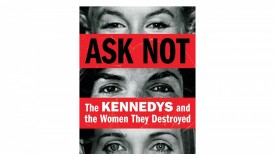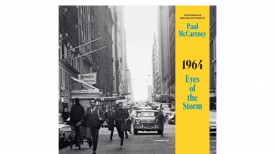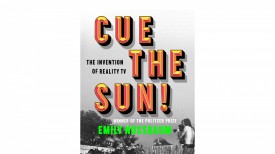‘The Playbook’ by James Shapiro Book Review: Revisiting 1930s Cultural Clashes

Dive into the cultural clashes of the 1930s with "The Playbook" by James Shapiro. Read this insightful book review now!(Photo : Amazon/James Shapiro)
James Shapiro's "The Playbook" offers an exciting and insightful look into the Federal Theatre Project (FTP), an initiative of the New Deal administration that aimed to rejuvenate American theater and democracy during the height of the 1930s culture war. Shapiro, a Shakespeare scholar, presents an interesting narrative that draws a clear link between the political strife of today and the cultural struggle in the 1930s.
The FTP staged approximately a thousand shows in 29 states between 1935 and 1939, bringing theater to a large audience of almost 30 million Americans. At that time, people believed the arts were as important to the country's health as industry and agriculture.
Hallie Flanagan, a modest theater professor who supported the arts as a democratic instrument, was in charge. The FTP presented Shakespeare with contemporary plays addressing urgent topics like racism, public health, and the impending menace of fascism. It employed over 12 thousand artists, including future luminaries like Orson Welles and Arthur Miller.
Innovative Productions and Social Impact
One of the most notable FTP performances was an adaptation of Sinclair Lewis' anti-fascist novel "It Can't Happen Here," which debuted simultaneously in eighteen places, and an all-Black "Macbeth" in Harlem, directed by Welles. These shows attracted a wide range of spectators and promoted a feeling of community and political consciousness while showcasing the FTP's variety and dedication to social causes.
However, the FTP's success was short-lived. The program was the first New Deal initiative to fall victim to political attacks led by the ambitious and bigoted Congressman Martin Dies from East Texas. Dies used the FTP to launch a broader assault on Roosevelt's New Deal, accusing the project of promoting "un-American" activities.
Shapiro meticulously details how Dies's tactics foreshadowed those of Senator Joseph McCarthy's House Un-American Activities Committee in the 1950s, setting a precedent for right-wing cultural warfare that persists today.
A Theatrical Political Arena
Shapiro's narrative is both historical and highly relevant. He draws clear lines from dismantling the FTP to contemporary cultural clashes. Dies' tactics - smearing reputations, disregarding impartiality, and presenting hearsay as fact - are similar to modern-day political strategies. Dies' hearings smeared the FTP as a communist front, exploiting fears and prejudices to dismantle a program that had provided not just entertainment but a lifeline and voice to millions during the Great Depression.
According to The Guardian, the book opens with the Dies Committee's 1938 hearings, during which Flanagan was interrogated in a spectacle reminiscent of a dramatic play. Shapiro vividly captures these scenes, showing how political hearings can become theatrical performances with high stakes and real-world consequences.
The Legacy of the Federal Theatre Project
According to AP News, Shapiro's epilogue conjectures about what would have happened if the FTP had lasted. He sees a more robust democracy, a more informed populace, and a more dynamic theater culture. Instead, the ongoing political and cultural conflicts are a legacy of the FTP's dissolution. By drawing connections between Roy Cohn, Dies, McCarthy, and Donald Trump, Shapiro exposes the history of right-wing politicians who have used inciting cultural fear as a political tool.
The book warns about the frailty of democratic institutions and the importance of the arts in society. In addition to revisiting a pivotal moment in American history, Shapiro's gripping account of the Federal Theatre Project sheds light on the political and cultural divisions that still exist today. His analogies highlight how ageless these conflicts are and how crucial the arts are to maintaining a robust democracy.
Conclusion
Anyone interested in the nexus between politics, society, and history should read Shapiro's "The Playbook." It is an engrossing and informative account that serves as a potent reminder of both the ongoing dangers that aim to divide people and the ability of art to bring people together.
RELATED ARTICLE: 'Endgame 1944' by Jonathan Dimbleby Book Review: An In-Depth Account of How Stalin Masterminded Victory in WWII
© 2023 Books & Review All rights reserved.
Popular Now
1
Books to Read After 'Fourth Wing': Top Picks for Fantasy and Romantasy Fans

2
‘The Secret Public’ by Jon Savage Book Review: An Insightful Look Into the LGBTQ Influence

3
Stephanie Regalado's 'If They Only Knew' Column Is Now A Book, Unleashing 60 Anonymous True Stories to Empower Women

4
'No Wire Hangers' Scene That Almost Did Not Happen: New Book Reveals Faye Dunaway's Struggles

5
Rare First Edition of Aphra Behn's Novel 'Oroonoko' Discovered in Kent: A Historic Literary Find

Latest Stories
Book Reviews
‘The Secret Public’ by Jon Savage Book Review: An Insightful Look Into the LGBTQ Influence

Book News
Stephanie Regalado's 'If They Only Knew' Column Is Now A Book, Unleashing 60 Anonymous True Stories to Empower Women

Book News
'No Wire Hangers' Scene That Almost Did Not Happen: New Book Reveals Faye Dunaway's Struggles

Book Reviews
‘The Perfect Couple’ by Elin Hilderbrand Book Review: A Captivating Summer Mystery

Book News
New Book ‘The Franchise’ Reveals Penguins President Kyle Dubas’ ‘Biggest Mistake’ as Maple Leafs GM











